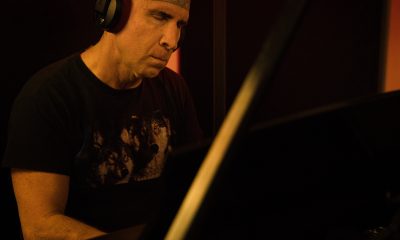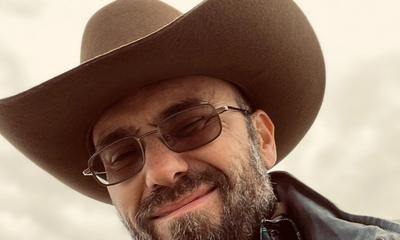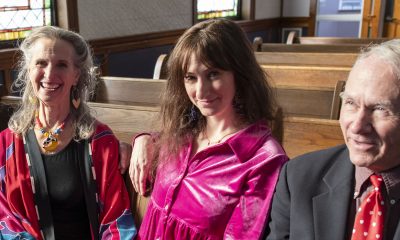Interview
An Intimate Interview with Chart-topping Singer-Songwriter John McDonough
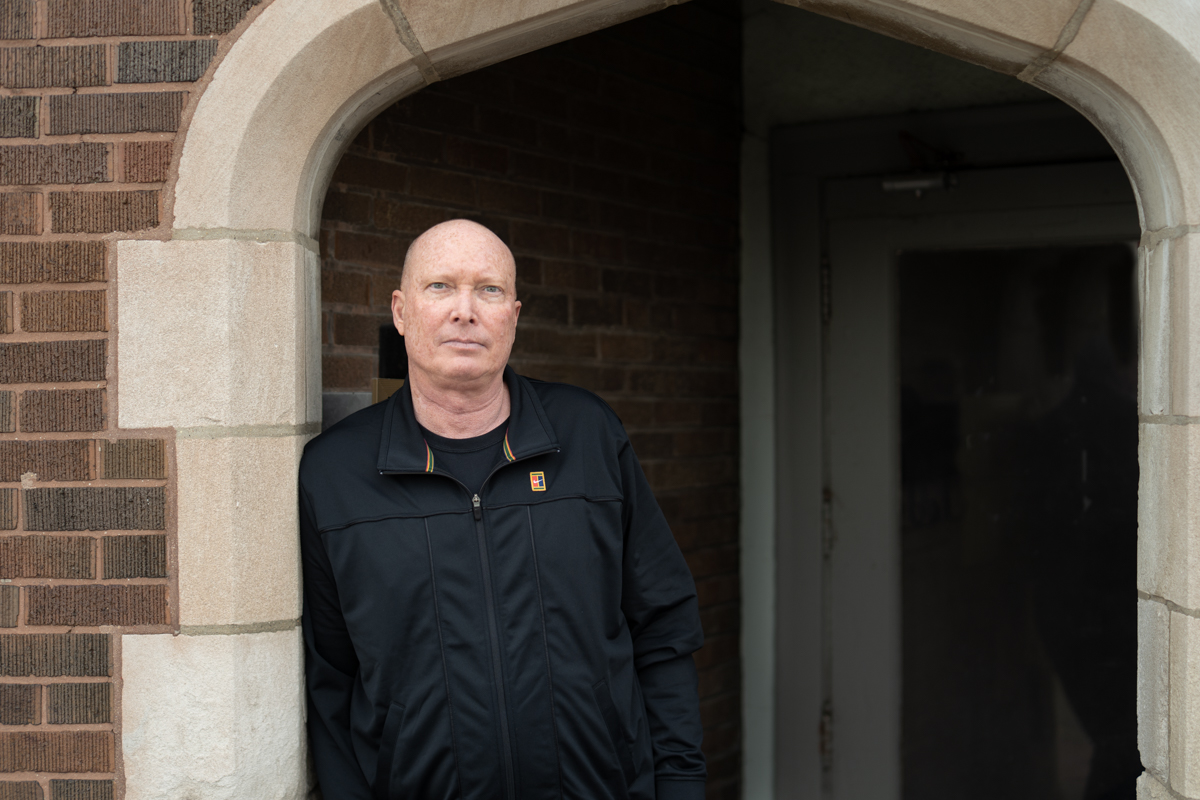
John McDonough has been climbing the ladder of success in the music biz for the past several years, culminating in his recent #1 National Radio Hits airplay hit, “Point Me East.” His follow-up, the title track from his highly successful EP, “We’ll Answer the Call”, is looking like it will repeat the feat. John took time from his busy schedule to sit down with us for an intimate one-one-one…
Honk: What led you to pursue a career as a singer-songwriter?
John McDonough: I have always loved to sing. As a kid, I would crank my stereo and sing along at the top of my lungs pretending I was on stage. I also loved creative writing from a young age. I even wrote a short novel when I was 12 years old. I was mesmerized by the emotion a single person could convey with only their guitar, their words, and their voice, and I wanted to be able to create that myself.
How do you approach the songwriting process?
I will think about a song for a time before I start trying to write anything. I will think about what I want to say and the feel of the music I am going for. Then I will create an outline of what I want to say in the verses and chorus. I won’t have the words written word for word, but I will know basically what I want to convey in each section of the song. I like to write the music and the lyrics at the same time. It really helps to have the song half written in my head before I sit down with the guitar and start really trying to create the finished product. I will also often take breaks when working on a song so I am mentally fresh for each section. I just finished a new song where I wrote the first verse and chorus, and purposefully stopped. I came back to it the next day and wrote the second verse. Being fresh enables me to say what I want to say as creatively and effectively as possible.
What inspires you to create music?
Two different things inspire me to create. One is the ability to express things that are going on in my life. I have written songs about unrequited love, the love I have for my niece who is very special to me, and everything in-between. I am also a history buff, and often moved to write about people in history who have experienced incredible circumstances and risen to the occasion. For example, my last EP titled ‘We’ll Answer The Call,’ tells the story of Joe Rantz, the Washington Husky rowing team, and their epic bid for gold in the 1936 Berlin Olympic Games. For my next CD I have written a couple songs about major people and moments in the Civil Rights movement of the 1950’s and 1960’s. I love sharing these stories of incredible people with my audience, and it makes me feel good to give them some added exposure I feel they deserve.
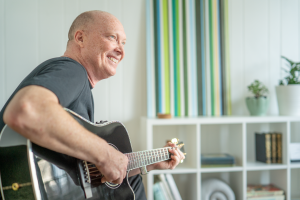
What have been some of the biggest challenges you’ve faced in your music career, and how have you overcome them?
One of the biggest challenges I faced early in my career was constant self-doubt. “Am I good enough for this incredibly tough career choice?” It took many years and some therapy to become confident enough to live with that question and fully commit to music. I committed to working as hard as I can to become as good as I can be, and not worry so much about the outcome. I often remind myself that I do this because I love it and there is nothing else I would rather be doing. I also accepted there are many levels of “success,” and I can have a successful and satisfying career even if I never sell out a stadium tour. Another tough challenge was playing the tough gigs where people weren’t really listening or paying attention. My self-confidence always took a big hit after those gigs. With more experience I learned how to use my humor and story-telling skills to better engage the crowd. I still have those tough nights, but I do my best to not let it get me down. I focus on the enjoyment of playing my guitar and singing and view it as an opportunity to gain more experience and be better in the future.
What is your biggest strength as a musician, and how do you leverage it in your work?
I think my biggest strength is my work ethic. I am 58 years old, and have accomplished some exciting things. I have had a number 1 song on a national radio chart, performed live on radio and TV, and played some big festivals. Even with this, I continue to study my craft on my quest to be the best I can be. I continue to take guitar lessons and am always studying other artists material. This field is too competitive to have any weaknesses, and I aim to be a great singer, guitarist, and songwriter. This work ethic has given me the ability and the confidence to continue to put myself out there and have the successes I have had.
What do you consider to be your most successful song or project, and why?
I would have to say my latest EP, ‘We’ll Answer at the Call,’ has been my most successful project. It has had the most streams of all my recordings, the most radio play with several songs hitting top 10 on several different national radio charts, and the best reviews in national and international publications. I also feel it has been so well received because there is so much variety in the songs while always staying true to my singer/songwriter identity. There are moments of traditional singer/songwriter styles, moments where songs have a 1970’s soft rock feel, and even moments of more current, acoustic pop vibes. I am very proud of the variety I was able to create within only five songs, while staying lyrically engaging and vocally interesting.
How do you stay current with trends and changes in the music industry, and how do you adapt your work accordingly?
Honestly I try not to worry about trends in the music industry within my creative work of being a singer/songwriter. I feel one is always going to be two steps behind and 15 minutes late to the “scene” if one is trying to make their work fit in with the current trend. I wouldn’t be staying true to myself if I was always trying to adapt my style to the current trend in hopes of being more successful. I do pay attention to the current trends in regards to the recording and production of music. I want my music to be engineered, mixed and mastered to todays standards so it translates sonically as best as possible.
Can you describe a time when you worked collaboratively with other musicians or producers?
I do most of my collaboration with musicians and producers in the studio when I am recording. I love this process! I love having the other musicians add their parts and help my songs really come alive. I have worked with the same musicians and producer for my last several projects, and I am very open to their ideas. Typically I will record my acoustic guitar and vocals at the same time. I have my engineer/producer set up the mikes, and I will get live takes of my song. Then we will layer on top of my track. Sometimes I will have ideas for what I want the other instruments to do. Often I let my musicians play parts they come up with. I know they will have ideas that I would never think of, and usually their ideas are just what the song needs. I am very lucky to have such creative and talented people in my corner, and they are always 100 percent committed to making my project as good as possible.
How do you handle criticism or negative feedback about your work?
I listen and think about what has been said. Usually, if the feedback is valid, I will agree with it and think of how I want to work with this criticism. I always remind myself that it’s going to be my name on the CD, and if I am as happy as possible with the end product, then I can live with any criticism or negative feedback.
What are your long-term career goals as a singer-songwriter, and how do you plan to achieve them?
My goal and dream is to be successful enough that I am playing to small theaters. I want to play to audiences that are there to hear me, and where I can really engage with the people. I love the nights I can talk about my songs and the history behind them. I plan to keep writing and recording with the goal of creating something so great it cannot be ignored. I also plan on continuing to play live, build my fan base, and create a grass roots movement to share my music with as many people as possible.
Interview
Nene Leakes Left Wide-Eyed By Chrisean Rock’s 12-Kid Reveal
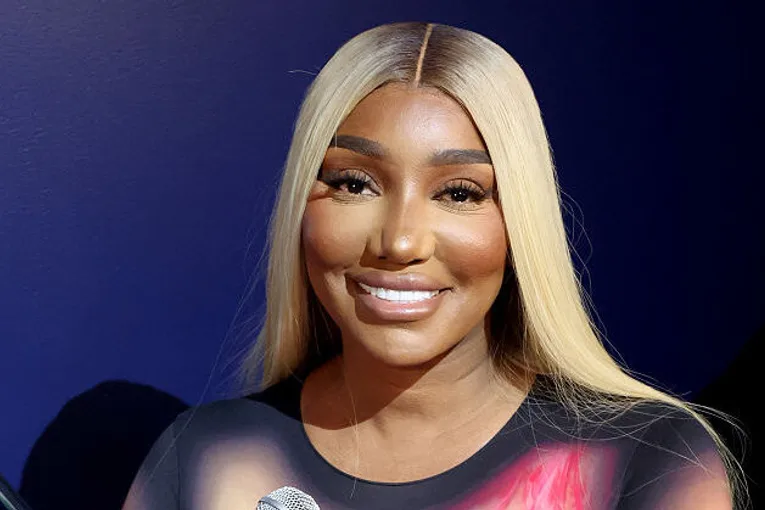
Reality icon Nene Leakes is no stranger to jaw-dropping interviews, but even she had to pause when Chrisean Rock dropped a bombshell on her latest appearance. As a guest on Nene’s talk show, the viral rapper and internet sensation opened up about her complicated relationship with Blueface, motherhood, and a surprise personal decision that had fans and Nene herself doing a double take. In a heart-to-heart moment, Nene delicately inquired about the infamous Blueface tattoo prominently inked on Rock’s cheek.
“Why you put him on your face because you have a beautiful face?” Nene asked, with the sass and sincerity only she can deliver. “Now, Chrisean… would you ever take it off?” Without hesitation, Chrisean confirmed what many fans didn’t see coming. “I’m do it on my stream,” she said confidently. “I want my fans to be a part of the process.” But just when the conversation seemed like it couldn’t get any more personal, Rock took it to another level by revealing she hopes to have twelve children in the future.
The confession left Nene and likely anyone watching with raised eyebrows and a host of follow-up questions. While Rock didn’t dive into the timeline or logistics, her conviction was clear. In an age where celebrities often filter their truths, Chrisean’s candidness struck a chord, if not a nerve. Nene, ever the seasoned host, managed to keep her cool, delivering her signature blend of shocked expression and knowing nod. “Twelve? Girl, you better get to work!”
Chrisean’s willingness to share her journey, including the removal of a very public symbol of her past and her dreams of a big family, gives a new dimension to the often misunderstood star. Whether or not the world is ready for Rock and her future football team-sized family, she’s doing things on her own terms. As for Nene, she may just need a moment to recover before the next guest walks in with a story to top this one.
Interview
Keke Opens Up On Why Her Jonathan Majors Interview Never Aired

Keke Palmer has always been open about her feelings, and this week was no exception as she talked about a canceled podcast episode featuring actor Jonathan Majors, who is currently facing legal challenges. Back in April, fans noticed a preview for what seemed to be an exciting and possibly controversial episode of her podcast, “Baby, This Is Keke Palmer.” The Wondry app described it with the phrase “Accountability. It’s a loaded word, right?” The episode was set to explore how society is changing its views on forgiveness, justice, and what it means to hold people, especially men, accountable for their actions.
Naturally, fans became curious when the episode didn’t air as planned. They wondered if it was canceled because of Majors’ legal issues or if Keke decided not to release it on her own. During a recent interview on “Way Up With Angela Yee,” Keke finally shared her thoughts. She explained that some of the decisions may have been beyond her control, but she spoke about it in a calm and respectful way. She didn’t blame anyone or go for shock value but hinted that there were bigger issues influencing the situation.
You can also read this: Keke Palmer Stands by Baby Daddy Darius Jackson’s New Path to Redemption in the Army
Keke’s honesty adds depth to ongoing discussions about celebrity culture, responsibility, and how media decisions are made. By choosing not to give too many details, she showed her maturity and professionalism, qualities her fans truly appreciate. This situation reminds creators of the careful balance they must maintain when discussing sensitive subjects. Keke, known for her honesty and charm, is willing to tackle tough conversations but understands when it’s best to hold back.
Whether or not the episode with Jonathan Majors will ever be released is still uncertain. However, Keke Palmer is not afraid to engage with difficult topics, she simply knows when to speak up and when to step back. In today’s world, where silence can often be misinterpreted as agreement, Keke demonstrates that sometimes, choosing to stay quiet is also a way of being accountable.
-
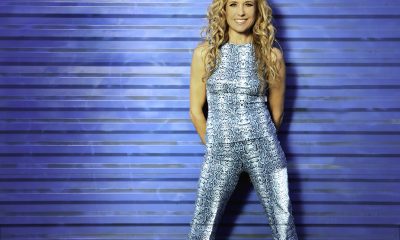
 Artist Spotlight2 days ago
Artist Spotlight2 days agoHope Easton channels tropical mischief and charm in new single “SexyReady”
-

 Artist Spotlight2 days ago
Artist Spotlight2 days agoSweetCandy! declares self-love and defiance on “UGLY”
-

 Artist Spotlight2 days ago
Artist Spotlight2 days agoBluntBrad Jr. finds calm ambition in the laid-back shine of “It’s All Good”
-

 Artist Spotlight2 days ago
Artist Spotlight2 days agoLavien drops a heartfelt Afrofusion plea that sticks to the soul with “Nobody”
-

 Artist Spotlight2 days ago
Artist Spotlight2 days agoLana Crow turns challenges into a celebration with “Laugh With You”
-
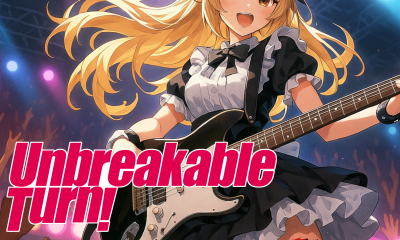
 Artist Spotlight3 days ago
Artist Spotlight3 days agoCircleKSK ignites an anime-metal collision on “UnBreakable Turn” ft. Anya J
-

 Artist Spotlight3 days ago
Artist Spotlight3 days agoRecc explores nostalgia and inner freedom in “Where the Wild thYngs Are”
-

 Artist Spotlight3 days ago
Artist Spotlight3 days agoAnnaBelle Swift delivers gentle hope and gratitude with new single “Heaven Sent”

